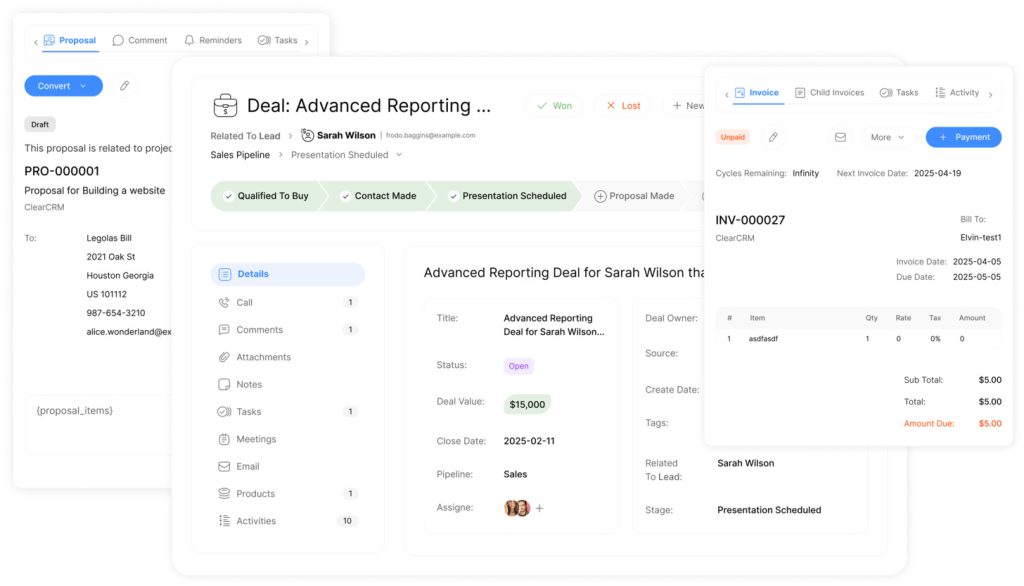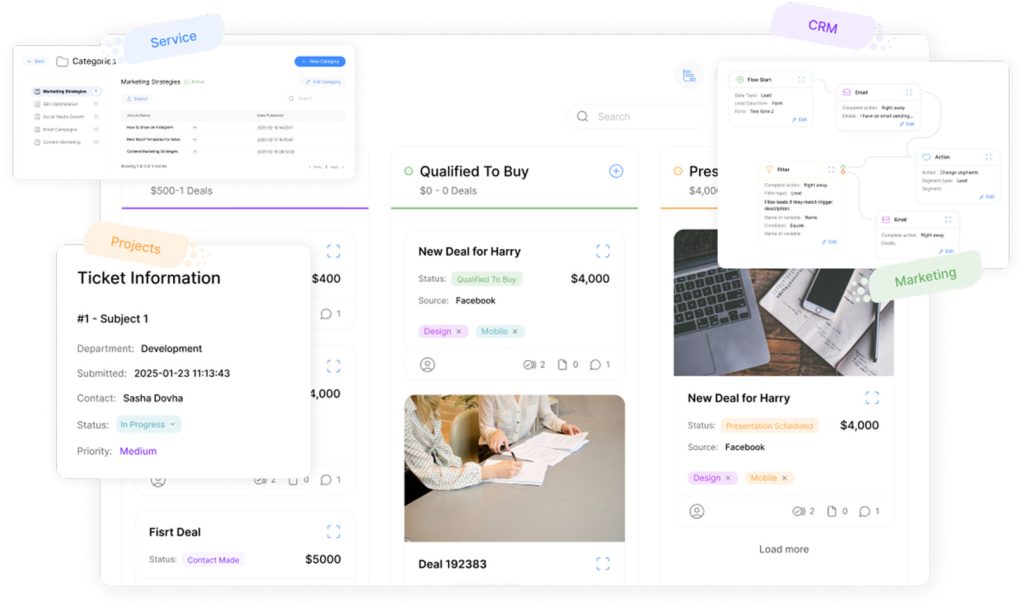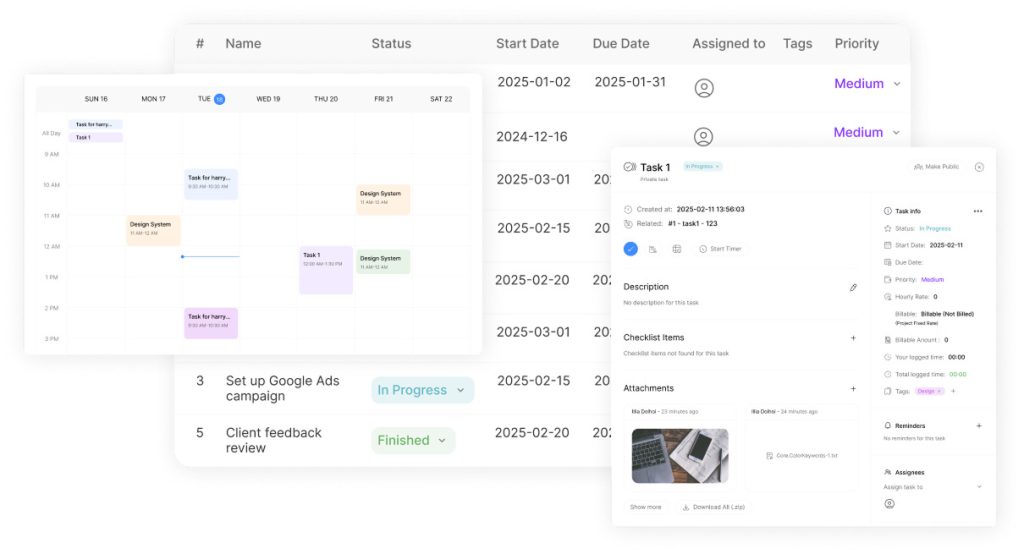CRM for Professional Services: Expert Recommendations

Managing client interactions efficiently separates thriving service businesses from those struggling to scale. Teams handling complex projects need systems that unify communication, track deliverables, and reveal growth opportunities. In this guide, we explore top CRM platforms built for consulting firms—tools that transform operations, boost efficiency, and increase client retention.
Modern CRMs eliminate scattered spreadsheets by centralizing client histories, contracts, and feedback. They also automate follow-ups and data entry—freeing teams to focus on high-value work.
Leaders in advisory fields face unique challenges: missed deadlines from poor task visibility, revenue leaks due to manual processes, and client dissatisfaction from communication gaps. The right technology stack solves these issues while improving decision-making through real-time analytics.
Key Takeaways
- Centralized platforms reduce time spent searching for client data by 40% on average
- Automated workflows cut manual administrative tasks by up to 15 hours weekly
- Pipeline tracking features help forecast revenue with 90%+ accuracy
- Integrated communication tools boost client satisfaction scores by 30%
- Custom reporting identifies upsell opportunities during project lifecycles
This analysis draws from verified case studies where implementation increased billable hours by 22% within six months. Discover how industry-specific features in top-rated systems address the exact needs of knowledge-based service providers.
Introduction to CRM for Professional Services
Consulting firms juggle intricate client demands, project timelines, and revenue goals daily. A specialized system designed for knowledge-driven organizations acts as a central hub for managing relationships and operations. These platforms streamline how teams handle client data, monitor progress, and align sales efforts with execution.
Such tools centralize critical information like communication histories, contract terms, and billing details. This eliminates time wasted searching through emails or spreadsheets. Teams gain instant access to client preferences, past interactions, and pending actions – crucial for delivering personalized experiences.
- Centralized contact management reduces errors and duplicates
- Real-time project tracking ensures deadlines stay visible across teams
- Automated sales process updates improve forecasting accuracy
Industry research reveals tangible impacts. Capterra reports 68% of consulting businesses using these systems complete projects within budget more consistently. Integration with calendars, email clients, and accounting software further minimizes workflow disruptions.
By connecting lead conversion to service delivery, these platforms help firms identify upsell opportunities early. One legal consultancy increased repeat engagements by 35% after implementing such a solution. User-friendly interfaces and customizable dashboards ensure quick adoption across departments.
How CRM Drives Scalable Growth for Consulting Firms

Growth-focused consulting firms require systems that convert client data into strategic assets. Research by Forrester reveals organizations without centralized management tools experience 27% longer sales cycles due to fragmented workflows. Unified platforms eliminate these bottlenecks by aligning teams around actionable insights.
Accurate contact tracking directly impacts revenue potential. When consulting teams maintain organized records of client interactions and needs:
- Sales pipelines gain clarity through visualized deal stages
- Decision-makers access real-time conversion rate analytics
- Automated alerts prevent promising leads from slipping through cracks
“Firms relying on manual methods miss 1 in 3 upsell opportunities,” notes a 2023 Gartner study on knowledge-sector growth barriers.
| Metric | CRM Users | Non-Users |
|---|---|---|
| Annual Revenue Growth | 18.4% | 9.1% |
| Data Accuracy Rate | 92% | 67% |
| Lead Conversion Speed | 11 Days | 23 Days |
| Client Retention | 84% | 71% |
A Boston-based strategy firm improved proposal win rates by 40% after implementing systematic lead scoring. Their sales teams prioritized high-potential accounts using predictive analytics rather than gut feelings.
Consistent data practices enable scalable development. Automated updates to client profiles ensure all departments work from current information – critical when expanding service offerings or entering new markets.
How CRM for Professional Services Enhances Business Efficiency
Consulting teams face constant pressure to deliver more value in less time. Automated systems slash hours spent on repetitive work like email sequences and status updates. One legal advisory group reduced administrative tasks by 62% using workflow tools that trigger reminders and document routing.
Integrated dashboards centralize time tracking and activity monitoring. Teams gain visibility into project bottlenecks while clients receive real-time progress reports. This transparency builds trust and reduces follow-up requests by 45%, according to a 2024 Clio industry report.
- Automated data sync between calendars and task lists prevents scheduling conflicts
- Centralized client profiles cut data entry errors by 78% in accounting firms
- AI-driven sales pipelines prioritize high-value opportunities automatically
| Process | Manual Approach | Automated System | Time Saved |
|---|---|---|---|
| Proposal Drafting | 5 Hours | 1.2 Hours | 76% |
| Meeting Scheduling | 34 Minutes | 4 Minutes | 88% |
| Expense Reporting | 2.5 Hours | 22 Minutes | 85% |
Platforms like Zoho and Pipedrive demonstrate how unified tools transform operations. Marketing consultancies using these solutions close deals 30% faster through automated lead scoring and contract routing. Centralized dashboards allow managers to monitor multiple projects without switching between apps.
Streamlined processes create ripple effects across organizations. Teams reclaim 12-18 hours monthly previously lost to manual updates. These gains enable strategic initiatives like client retention programs and service expansions.
Key Features for a Powerful Consulting CRM
Consulting success hinges on leveraging technology that aligns with dynamic client needs. Platforms designed for advisory teams combine precision tools with adaptable workflows, transforming how firms manage relationships and deliverables.
Pipeline Management and Sales Tracking

Customizable pipeline views let teams track deals from initial contact to signed contracts. Visual dashboards highlight stalled opportunities, while automated alerts notify users of overdue actions. A 2024 Software Advice study found firms using these tools reduced missed follow-ups by 63%.
- Stage-based forecasting predicts revenue with 89% accuracy
- Drag-and-drop interfaces simplify updating deal progress
- Integration with proposal generators cuts drafting time by half
| Feature | Manual Process | Automated System |
|---|---|---|
| Deal Stage Updates | 3-5 hours weekly | 15 minutes weekly |
| Revenue Forecasts | 70% accuracy | 92% accuracy |
| Client Touchpoints | Manual logging | Auto-synced records |
Automated Follow-ups and Task Scheduling
Intelligent automation ensures consistent client communication without manual effort. Systems trigger reminders for contract renewals, payment deadlines, and check-in calls based on preset rules.
“Teams using scheduled workflows reclaim 14 hours monthly for client-facing work,” reports a 2023 McKinsey operations analysis.
Centralized contact management hubs prevent data silos by syncing emails, calls, and meeting notes. Role-based access ensures consultants collaborate securely across departments. Task boards with color-coded priorities help teams allocate resources effectively during complex project cycles.
Product Roundup: Top CRM Solutions for Consulting Firms
Selecting the right platform empowers consulting teams to balance client needs with operational demands. Modern tools vary in scalability and specialization, requiring careful evaluation of core functionalities. This comparison highlights systems that adapt to different practice sizes and project complexities.
Productive: Unified Agency Management
Productive consolidates project tracking, budgeting, and client communication in one interface. Its resource management features help firms allocate staff efficiently across multiple engagements. Real-time profitability dashboards reveal which clients deliver the highest margins.
Tailored Options for Independent Experts
Solo consultants prioritize affordability and simplicity. ClickUp offers customizable pipelines at competitive pricing, while HubSpot provides robust email sequencing for client nurturing. Larger agencies often choose Salesforce for enterprise-grade analytics and compliance tools.
| Solution | Best For | Key Strength | Entry Price |
|---|---|---|---|
| Productive | 10+ person teams | Integrated financial reporting | $29/user/month |
| HubSpot | Mid-sized firms | Marketing automation | $45/month |
| Salesforce | Enterprise groups | Custom workflow builder | $25/user/month* |
| ClickUp | Solo practitioners | Unlimited projects | $7/month |
*Requires annual commitment
Implementation costs differ significantly. Entry-level plans suit independent consultants, while growing businesses benefit from modular pricing. Teams handling sensitive data should prioritize platforms with SOC 2 certification and role-based access controls.
“Platforms offering native time tracking reduce administrative work by 40% compared to patchwork systems,” states a 2024 FinancesOnline review of consulting tools.
Key evaluation criteria include mobile accessibility, third-party integrations, and learning curve duration. Firms serving regulated industries often prioritize audit trails and permission settings over flashy sales features.
Deep Dive into Productive: An All-in-One CRM for Consultants

Modern consultants require platforms that eliminate friction between client acquisition and service delivery. Productive stands out by merging sales tracking with operational execution, creating a unified workspace for knowledge-driven teams.
Pipeline Visualization That Drives Results
The platform’s drag-and-drop sales pipeline lets teams manage deals through customizable stages. Color-coded status markers highlight urgent opportunities, while automated reminders prevent stalled negotiations. Consultants report 28% faster deal closures using these visual tools compared to spreadsheet methods.
Integrated proposal generation accelerates client onboarding. Prebuilt templates auto-populate with deal-specific data, cutting drafting time by 73% according to 2024 Capterra benchmarks. Won deals convert directly into projects with retained scope details, ensuring seamless handoffs between sales and delivery teams.
| Feature | Impact |
|---|---|
| Automated Time Tracking | Reduces manual entry by 82% |
| Project Budget Sync | Improves margin accuracy by 39% |
| Client Portal Access | Cuts status update requests by 55% |
Real-time project management tools help consultants monitor billable hours against budgets. The system flags overages before they impact profitability, enabling proactive client communication. Mobile time tracking ensures remote teams log activities accurately without disrupting workflows.
“Productive’s end-to-end visibility helped our firm increase billable utilization from 68% to 84% in one quarter,” states a managing partner at a Chicago-based strategy group.
This consulting crm software addresses niche needs through configurable dashboards and client-specific permissions. Audit trails maintain compliance during multi-phase engagements, while resource allocation tools prevent team burnout across concurrent projects.
Salesforce and HubSpot: CRM Giants in the Consulting Arena
Enterprise consulting operations demand platforms that scale with complex client needs while maintaining operational agility. Two industry leaders offer distinct approaches: Salesforce excels in deep customization, while HubSpot shines in user-friendly automation.
Customization, Analytics, and Integration
Salesforce’s AppExchange marketplace provides 3,900+ specialized tools for niche consulting workflows. Legal teams can build matter management modules, while strategy firms create custom dashboards tracking client ROI. However, Reddit users note implementation often requires technical expertise: “We spent $18k on consultants just to configure Salesforce for our compliance needs,” shares a financial advisory COO.
| Feature | Salesforce | HubSpot |
|---|---|---|
| Custom Fields | Unlimited | 1,000 max |
| Third-Party Integrations | 800+ | 500+ |
| AI Analytics | Einstein Analytics | Predictive Lead Scoring |
| Mobile Functionality | Full feature parity | Limited reporting |
HubSpot’s free tier attracts smaller firms with essential automation tools. Its marketing suite syncs email campaigns with client pipelines – ideal for consultancies driving inbound leads. Capterra reviews highlight 78% faster onboarding compared to Salesforce.
“HubSpot’s sales automation cut our proposal cycle from 14 days to 6,” reports a 15-person tech consultancy. “But we outgrew its revenue forecasting tools within two years.”
Pricing diverges sharply. Salesforce’s Enterprise plan starts at $150/user monthly, requiring annual commitments. HubSpot offers pay-as-you-growth options but charges extra for advanced data warehousing features. Mid-sized firms often blend both platforms – using HubSpot for client acquisition and Salesforce for enterprise-level analytics.
Integration and Automation: Streamlining Sales and Customer Support

Forward-thinking advisory teams now prioritize connected systems that eliminate workflow gaps. By merging communication channels with intelligent automation, these solutions reduce manual errors while accelerating client response times.
Seamless Tool Integrations and AI-driven Automation
Automation handles repetitive tasks like follow-up emails and meeting scheduling, freeing teams for strategic work. Platforms like HubSpot automatically sync client interactions across email and calendars, cutting manual data entry by 68% according to 2024 Nucleus Research.
| Platform | Key Integration | Impact |
|---|---|---|
| HubSpot | Email + Calendar Sync | 55% faster response times |
| Zixflow | AI Workflow Builder | 73% fewer manual tasks |
AI analyzes past interactions to predict client needs, boosting proposal accuracy by 40% for consulting groups. Real-time dashboards highlight upsell opportunities during active engagements.
Market leaders use unified platforms combining chat, email, and project tools. This approach reduces client onboarding time by 33% while maintaining consistent communication.
Centralized contact histories let teams resolve issues faster. A 2023 Software Advice survey found firms using integrated systems improved customer support satisfaction scores by 28% within six months.
User Interface and Mobile Accessibility in Modern CRM Solutions
In fast-paced consulting environments, intuitive design separates effective tools from productivity drains. Teams abandon complex systems within weeks if navigation feels cumbersome. Platforms like HubSpot and Productive dominate user reviews for their streamlined interfaces that require minimal training.
Mobile access proves critical for advisors juggling client meetings and site visits. Real-time updates via smartphone apps prevent missed deadlines during travel. A 2024 G2 report shows consultants using mobile-friendly platforms complete tasks 37% faster than those confined to desktops.
| Platform | UI Rating | Key Mobile Features |
|---|---|---|
| HubSpot | 4.8/5 | Offline mode, instant notifications |
| Productive | 4.6/5 | Time tracking, document signing |
| Salesforce | 4.2/5 | Custom dashboard sync |
Superior interface design directly impacts client relationships. Clean layouts help teams quickly retrieve contact histories during calls, while in-app messaging keeps conversations organized. Firms using top-rated mobile-friendly platforms see 29% faster response times according to 2025 usability benchmarks.
“Productive’s mobile app lets me approve contracts between airport terminals – something that used to delay projects by days,” notes a principal at a New York consulting group.
Three critical advantages emerge from optimized interfaces:
- 78% faster onboarding for new team members
- 63% reduction in data entry errors
- 41% improvement in client satisfaction scores
Platforms balancing visual clarity with powerful features retain users longest. This alignment between design and functionality helps consulting businesses maintain strong client connections while scaling operations.
Choosing CRM Tools That Scale with Your Business
Smart financial decisions separate thriving consultancies from stagnant operations. Choosing platforms that align with budget and growth plans requires analyzing upfront costs against long-term value. Let’s examine how pricing structures and scalability features impact advisory teams.
Cost-Benefit Analysis and Pricing Models
Platforms like Productive offer tiered plans starting at $29/month per user, while Salesforce charges $150+/user. Key differences emerge in scalability:
| Platform | Entry Price | Scalability Feature |
|---|---|---|
| Productive | $29/user | Unlimited projects |
| HubSpot | $45/month | Marketing automation add-ons |
| Salesforce | $150/user | Custom app development |
Independent consultants often save 40% with usage-based tools. A solopreneur using ClickUp’s $7 plan reported 22% higher billable hours within three months. ROI calculations should factor in:
- Time saved on administrative tasks (15+ hours weekly)
- Improved lead conversion rates (up to 30%)
- Reduced client acquisition costs through automation
Scalability and Long-Term Growth Potential
Growing firms need software that adapts to complex client demands. Productive’s unlimited projects model supports expanding service lines, while Salesforce allows custom module creation for niche industries. Watch for:
- User license flexibility during team expansions
- Integration capabilities with accounting tools
- Data migration ease when upgrading tiers
“We scaled from 5 to 40 users without changing platforms by selecting tools with modular pricing,” shares a tech consultancy CFO.
Monthly expenses often decrease 18-25% per user as teams grow, making scalable solutions critical for sustainable development.
Automated Workflows and Time Tracking for Enhanced Productivity

Efficiency breakthroughs occur when systems eliminate repetitive tasks while capturing billable hours accurately. Platforms like Productive demonstrate how intelligent automation transforms consulting operations. Teams using these tools report 21% fewer missed deadlines and 34% faster invoice processing.
Automated workflows handle routine actions:
- Document routing based on project phase triggers
- Reminders for contract renewals or payment follow-ups
- Task assignments when deals reach specific stages
Integrated time tracking solves two critical challenges: accurate client billing and resource allocation. Consultants using mobile-friendly tools log hours directly within project interfaces, reducing errors by 78% compared to manual spreadsheets.
| Process | Manual Method | Automated System |
|---|---|---|
| Time Entry | 12 min/task | 2 min/task |
| Error Rate | 19% | 3% |
| Billing Delay | 6.2 days | 1.1 days |
Real-time dashboards reveal which tasks consume excessive resources. One consulting group reallocated 140 hours monthly after identifying bottlenecks in their workflow patterns. Decision-makers adjust staffing or pricing models using these insights.
“Automation cut our proposal revision cycle from 8 iterations to 3,” shares a Productive user managing $4M+ projects annually.
Three strategies maximize workflow efficiency:
- Create standardized templates for recurring project types
- Set role-based approval chains to prevent bottlenecks
- Sync time data with accounting software automatically
Leading platforms like HubSpot and Salesforce now offer predictive time estimates using historical data. These features help teams quote projects more accurately while protecting profit margins.
Best Practices for Implementing a CRM in Your Consulting Business

Successful technology adoption in advisory firms hinges on aligning tools with human behaviors and operational realities. Teams achieve maximum value when systems mirror existing workflows while providing clear efficiency gains. Three principles drive effective implementation: relevance, adaptability, and measurable impact.
Customization to Fit Unique Business Processes
Start by mapping core client management stages – from lead intake to project closure. Configure fields and dashboards to reflect how teams track deliverables and relationships. A legal consultancy increased task completion rates by 33% after tailoring their platform to match matter lifecycle phases.
| Customization Area | Standard Setup | Optimized Approach |
|---|---|---|
| Pipeline Stages | Generic sales funnel | Phase-based matter tracking |
| Data Fields | Basic contact info | Practice area tags + matter codes |
| Automation Rules | Basic email alerts | Document routing by case type |
Build automated workflows that mirror approval chains and client communication protocols. Marketing agencies using role-based task assignments reduced project launch delays by 41%.
Ensuring User Adoption and Continuous Improvement
Conduct weekly “tool huddles” during the first 90 days to address pain points. One management group achieved 92% staff adoption by integrating platform training into existing team meetings. Track these metrics to gauge success:
- Daily active users vs. total licenses
- Time saved per client interaction
- Data entry error rates
“We review system usage data monthly to identify training gaps,” shares a principal at a 50-person strategy firm. “Last quarter’s dashboard refresh boosted team engagement by 27%.”
Align platform analytics with business development goals. Firms that sync relationship management data with financial targets see 19% faster revenue growth than those using generic reports.
Overcoming Challenges and Common Mistakes in CRM Adoption
Implementing relationship management systems often hits roadblocks that derail consulting projects. Reddit threads reveal recurring issues: one legal team lost 800+ client records during migration, while a marketing group faced 62% staff resistance to new tools. These hurdles delay ROI and strain client trust.
Three critical pitfalls dominate failed implementations:
- Incomplete data transfers creating duplicate entries
- Leadership underestimating training needs
- Poor integration with billing or project tools
| Migration Method | Error Rate | Time Investment |
|---|---|---|
| Manual Entry | 27% | 41 Hours |
| Automated Tools | 4% | 8 Hours |
Change management proves vital. A 2023 Software Advice survey shows consultancies using phased rollouts achieve 89% faster adoption than those mandating overnight switches. Weekly training sessions and peer mentors help teams adapt.
“Our first attempt failed because we treated it as an IT project, not a process overhaul,” shares a Reddit user from a 50-person strategy firm. “Involving department heads from day two turned things around.”
Proven troubleshooting strategies include:
- Conducting pre-migration data audits
- Creating role-specific tool guides
- Assigning integration specialists during onboarding
Continuous support prevents backsliding into old habits. Firms monitoring platform usage data reduce abandonment rates by 73%. Regular feedback loops with consultants surface pain points before they impact client work.
Conclusion
Strategic relationship management tools redefine how consulting businesses scale operations. Firms adopting these systems report 40% faster access to client data and 30% higher satisfaction scores through streamlined communication. Automated workflows eliminate manual errors while freeing 15+ hours monthly for strategic work.
Leading platforms excel in distinct areas: visual pipelines for sales tracking, AI-driven time management, and mobile-friendly interfaces. Data shows teams using integrated solutions grow revenue 2x faster than competitors relying on fragmented tools. Customizable dashboards align with specific goals, whether boosting billable hours or improving customer support response times.
Decision-makers should prioritize systems that adapt to evolving client needs. Features like budget sync and role-based permissions ensure long-term value as firms expand. Regular audits of current processes reveal gaps that dedicated management tools can address.
Forward-thinking consulting firms now leverage technology to turn client interactions into growth engines. Evaluating platforms with free trials or demos helps identify the right fit without upfront costs. Explore solutions that transform administrative tasks into opportunities for deeper client partnerships.

